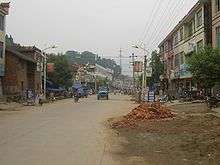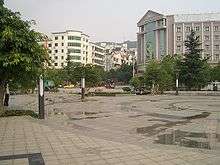Towns of the People's Republic of China
| This article is part of a series on |
| Administrative divisions of China |
|---|
|
Analogous county level units Management areas Management committee |
|
Townships
Subdistricts County-controlled districts (pilot) |
|
Analogous township level units Management areas Management committee Areas Farms area, Prison area, University towns etc. |
|
|
|
History: before 1912, 1912–49, 1949–present Administrative division codes |
When referring to political divisions of China, town is the standard English translation of the Chinese 镇 (traditional: 鎮; pinyin: zhèn; Wade–Giles chen4). It is a fourth-level administrative unit, i.e. one of the units into which counties and districts are divided.
Another common fourth-level unit is the township (乡; pinyin: xiāng); a township is typically smaller in population and more remote than a town (zhèn).

Similarly to a higher-level administrative units, the borders of a town (zhen) would typically include an urban core (what one would call a "town" in Europe or America - a small town with the population on the order of 10,000 people), as well as rural area with some villages (村 cun, or 庄 zhuang).
Map representation
A typical provincial map would merely show a zhen with a circle centered at its urban area and labeled with its name, while a more detailed one (e.g., the map of Xianning prefecture-level city at its official web site) would also show the borders dividing the county or county-level city into town (镇) and/or township (乡) units.

The town (zhen) in which the county government (and the county's main urban area) is located is often "invisible" on less-detailed maps, because its circle is usually labeled with the name of the county rather than the name of the actual zhen into which this urban area falls. For example, the county government of Tongshan County, Hubei is located in Tongyang Town (通羊镇, Tongyang Zhen),[1] but the maps would normally show it with a circle labeled "Tongshan County" (通山县) or simply "Tongshan" (通山). Road signs would also normally show distance to "Tongshan" rather than "Tongyang".
On the other hand, more detailed maps - e.g., maps of individual prefecture-level cities in a provincial atlas - would label the county seat location with both the name of the county (e.g., 通山县, Tongshan Xian) and, below, and in a smaller font, with the name of the township (e.g., 通羊镇, Tongyang Zhen).[2]
Intercity buses, trains, or riverboats destined to, or stopping at a county seat may designate its destination either by the name of the county or the name of the county-seat township.
Usage of zhen in Taiwan
In contrast to the PRC, in the official translation adopted in the ROC, both xiāng (鄉) and zhèn (鎮) are translated as "townships", with zhèn specifically being "urban" township, 'with 'xiāng specifically translated as "rural" township
References
- ↑ Google Maps: . To get to Tongshan, Hubei, one can first search Google Maps for "Xianning", and then scroll south and south-east along S208 and S209
- ↑ Compare e.g. the provincial map and individual prefectures' maps in the Road Atlas of Hubei (湖北省公路里程地图册; Hubei Sheng Gonglu Licheng Dituce; published by 中国地图出版社 SinoMaps Press, 2007, ISBN 978-7-5031-4380-9), or in any other comparable atlas.